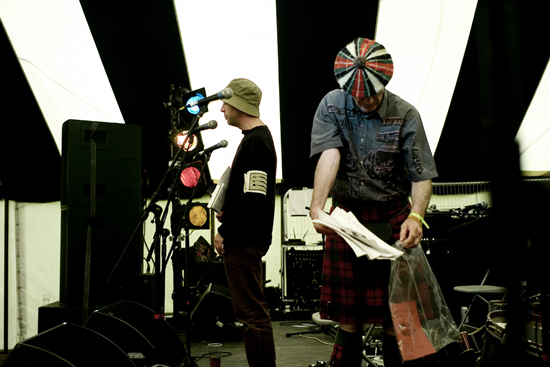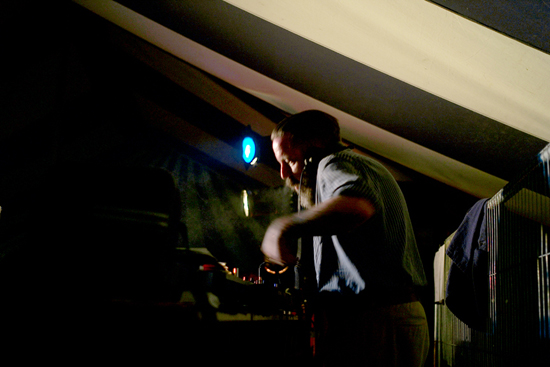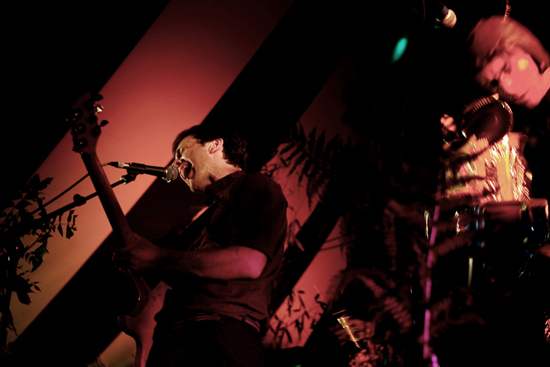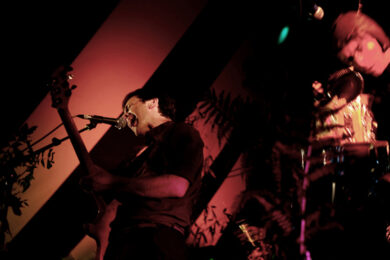Many festivals like to make a great fist of their location, but few have a setting to rival Port Eliot. Swifts are overhead, a stoat scarpers through the leaf mold, and we put up our tent to a fusillade of pops in the distance, signalling an afternoon of bloodsport on a neighbouring estate. Credit to the gentry of St Germains (one of whom was apparently in 90s types Rialto), for welcoming in a no less raucous few thousand for a weekend of high-end food for mind and body at the Port Eliot Literary Festival, which takes place in the pleasingly unfussy grounds of their Grade 1 listed home. You can wander freely along paths the rodedendrons and trees, and the outdoor cinema screen (a chilly late night viewing of The Red Shoes concludes Friday night) has behind it the viaduct that carries the London to Penzance line over a muddy tributary of Plymouth Sound.
It goes without saying that Port Eliot is posh in atmosphere and attendee. The campsite is a showcase of Country Living camping chic, with teepees, yurts, firepits and fancy stoves topped with smoke-blackened Italian coffee pots. The site newsagent proudly proclaims “Daily Mail not sold here”. Yet unlike many of the other “boutique” festivals that have sprung up in recent years, Port Eliot never feels like a peculiar weekend escape for a thirsty prolonging of kidulthood under the premise of art. There are no over-25s in facepaint here.
Saturday begins with an interesting hour curated by occasional Quietus writer Roy Wilkinson. Wilkinson has written a rock and family memoir of his time managing British Sea Power, two of whom are his brothers. From his reading we learn that the book’s narrative and band history are driven by their dad, who manned anti-aircraft guns during the Second World War and in his late 70s became a fan of the likes of Black Flag and Bad Brains. But his chief affection is for the Butthole Surfers, and Mr Wilkinson Snr would give advice to his sons with the exhortation “Do it for your ma! Do it for the Butthole Surfers!” Do It For Your Mum is a rock memoir unlike any other, written in a wonderfully florid style: for instance, a vision of a BSP Festival somewhere in Eastern Europe would feature a display by an aircraft described as "the retro-desirable Moog synthesiser of aviation". Expect more from this excellent book on The Quietus in due course.
In addition to the reading, Wilkinson is joined by Jock Scott, a man of indefinable age and non-linear thought pattern, who subverts the notion of the misty-eyed Scottish balladeer with coarse, ruggedly delivered verse. A bizarrely underregarded writer – you suspect in part because he had better things on his mind – Scott previous worked with Davey Henderson of The Fire Engines and Nectarine No.9. He deals with accusations of sounding like John Cooper Clarke by paying tribute to the bard of Salford and reciting his next poem in the appropriate style, and teeters on the edge of sense and brilliance. "This is not my thing all all" harrumphs one ruddy man before heading off in search of more serious fare. For the rest of us, it’s clear that the time for a Jock Scott revival is nigh.

This all takes place on the waterfront stage curated by friends of the Quietus Caught By The River, who over the weekend provide sanctuary from those things you need to keep a weather eye out for at all art festivals: drunk pillocks with acoustic guitars, people offering a poem for a hug, and fruity women in expensive bohemian chic waving bottles of white wine and honking for their daughters: “Petronella! Petronella, darling, where are you?” wafts across the site at one point. I did not make that up.
You also have to avoid the small tent that, although it serves a good Doom Bar, seems to insist on showcasing the very worst kind of cabaret: "with his penises three he penetrated me", warbles one lady. The Idler magazine tent has some excellent talks (Jez Butterworth, John Cooper Clarke) but, being posh, they seem to have recreated a nostalgic public school complete with tuck shops, biscuits presumably sold like cigarettes, singly, for nocturnal amusement. Elsewhere, there’s a juggler, and a man in tights, standing on another man’s shoulders. This was entertainment, before we invented television. And then we did invent television, and that was shit too. But these are minor gripes: all festivals come with the problem of their crowds, and it’s hard to be cynical about a do in such a terrific, sunlit valley, with no mud, fine drinks, and freshly cooked fish and chips (with mushy peas and a homemade tartar sauce) coming in at a reasonable seven quid.
John Cooper Clarke, also playing in the big top, is currently at the top of his game, as this recent feature explained. Nattily dressed, he looks like punk rock man of letters John Robb without the punishing exercise regimen. He delivers his "Class A material at charity prices": deadpans one-liners and character study poetry from behind the usual black shades. This is the revenge of the autodidact: "There are very few ways a teenage girl can rebel against a father like me, literacy is about it” he says as part of a monologue about his daughter coming home "with a face like tripe" and announcing she has to write a poem about 50 years of Amnesty International. John Cooper Clarke’s brilliance is in his ability to raise the roof at festivals or clubs of every sort, even keeping The Fall’s league of bald headed men placated on his numerous support slots with MES & co. And of course he ends with ‘Evidently Chicken Town’, which he describes as "a great favourite among discerning people everywhere", adds its use on The Sopranos "makes me capo di tutti capi of poetry." ‘Evidently Chicken Town’ is no post punk relic, but bracingly relevant today: it’s essentially John Betjeman’s ‘Slough’ sped up for more urgent times; English, classless, rude and right.
In the Sir John Soane-designed conservatory behind the main house there’s an excellent vegetable arranging competition. As news of Amy Winehouse’s untimely demise spreads across the site, the young girl who won the competition with the entry "Amy Winehouse meets Elvis" (their hair rendered in aubergine) is upset, fearing she may have inadvertently committed voodoo.
Then it’s time for Fisherman’s Friends, 10 burly blokes from the tiny Cornish village of Port Isaac who, since 1995 have been gathering to sing the traditional repertoire of the briny. Given that we’re wassailed on all side by linguistic students graduates with po-faced finger in the ear twee folk, this coarse richness is a real pleasure, evidence that traditional song doesn’t have to be prettified and divorced from the means of production. There’s a song about whales – “it’s just a great big bit of sushi isn’t it?” says the darkly funny man on the left, bald with a handlebar moustache. "Ere,” says the bloke two ‘Friends down, ”if ever we have a tsunami rushing through the breakwater at our village of Port Isaac, he just needs to open his mouth, swallow the bloody lot.” Their acapella songcraft is a history lesson to lives bravely lived and lost: we learn that proportionally, Cornwall lost more of its population than Scotland or Ireland during the 19th century. Fisherman’s Friends are the antidote to whimsy, and good luck to them.
Back to Caught By The River, where Pulp’s PR man Steve is catching umpteen bass in the muddy creek that runs past the stage. Perhaps the fish are maddened by Andrew Weatherall’s DJ set in the CBTR tent, and wish to leap out of the water to join in the fun? Founders of Heavenly Records, the people behind Caught By The River aren’t droning Anglican anglers, enthusing mustily on luring slippery conquests from lazy English streams, so Andrew Weatherall’s DJ set gets a few hundred square metres of south Cornwall heaving . Again, credit to Port Eliot for allowing a walloping PA on the foreshore. One of the curses of these supposedly highbrow festivals is their ineptitude when it comes to refreshed dancing: usually the aesthetic embarrassment of a guilty pleasures disco reigns. No fear that happening here.

In 15 hours this tent will host a two-hour seminar about bird extinction, and a talk on fishing and more from a panel featuring Chris Yates (the Lester Bangs or Jonathan Meades of angling writing). But right now, Weatherall (as ever a greaser) plays a set of house that nicely tees things up for yet another triumphant performance from British Sea Power. The group play a clattering set that towers above their contemporaries as it takes a shovel to indifference: the insane ‘Mongk’, a ferocious ‘Apologies To Insect Life’, an epic ‘Rock In A’ with the invasion of a dancing robot and traditional scaling of the tentpole by guitarist Martin Noble to conclude. This tent is situated at the bottom of a rock face, presumably from where the rock was cut to build the house. At the top, under the strange shadows of artificially lit trees, stands an obelisk. It’d be nice to think that under it lies a late Lord of St Germans, and that he is well pleased.



